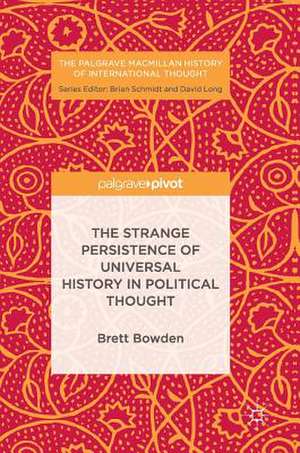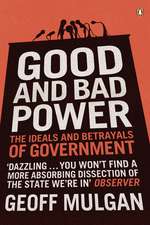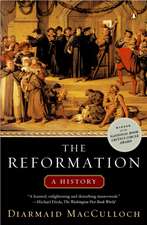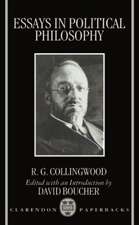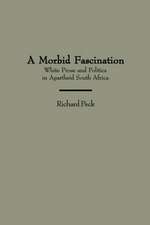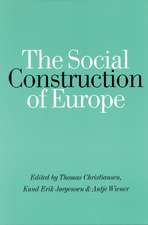The Strange Persistence of Universal History in Political Thought: The Palgrave Macmillan History of International Thought
Autor Brett Bowdenen Limba Engleză Hardback – 5 apr 2017
This book explores and explains the reasons why the idea of universal history, a form of teleological history which holds that all peoples are travelling along the same path and destined to end at the same point, persists in political thought. Prominent in Western political thought since the middle of the eighteenth century, the idea of universal history holds that all peoples can be situated in the narrative of history on a continuum between a start and an end point, between the savage state of nature and civilized modernity. Despite various critiques, the underlying teleological principle still prevails in much contemporary thinking and policy planning, including post-conflict peace-building and development theory and practice. Anathema to contemporary ideals of pluralism and multiculturalism, universal history means that not everyone gets to write their own story, only a privileged few. For the rest, history and future are taken out of their hands, subsumed and assimilated intoother people’s narrative.
| Toate formatele și edițiile | Preț | Express |
|---|---|---|
| Paperback (1) | 409.80 lei 6-8 săpt. | |
| Springer International Publishing – 21 iul 2018 | 409.80 lei 6-8 săpt. | |
| Hardback (1) | 417.90 lei 6-8 săpt. | |
| Springer International Publishing – 5 apr 2017 | 417.90 lei 6-8 săpt. |
Din seria The Palgrave Macmillan History of International Thought
- 18%
 Preț: 723.35 lei
Preț: 723.35 lei - 18%
 Preț: 780.52 lei
Preț: 780.52 lei -
 Preț: 384.70 lei
Preț: 384.70 lei -
 Preț: 383.71 lei
Preț: 383.71 lei -
 Preț: 389.11 lei
Preț: 389.11 lei -
 Preț: 385.62 lei
Preț: 385.62 lei -
 Preț: 383.71 lei
Preț: 383.71 lei -
 Preț: 386.61 lei
Preț: 386.61 lei - 15%
 Preț: 640.24 lei
Preț: 640.24 lei - 15%
 Preț: 640.06 lei
Preț: 640.06 lei -
 Preț: 389.70 lei
Preț: 389.70 lei -
 Preț: 394.87 lei
Preț: 394.87 lei -
 Preț: 388.52 lei
Preț: 388.52 lei -
 Preț: 381.98 lei
Preț: 381.98 lei - 18%
 Preț: 724.63 lei
Preț: 724.63 lei -
 Preț: 383.50 lei
Preț: 383.50 lei - 15%
 Preț: 640.88 lei
Preț: 640.88 lei -
 Preț: 383.50 lei
Preț: 383.50 lei - 15%
 Preț: 639.59 lei
Preț: 639.59 lei - 15%
 Preț: 640.71 lei
Preț: 640.71 lei - 18%
 Preț: 733.03 lei
Preț: 733.03 lei - 18%
 Preț: 727.48 lei
Preț: 727.48 lei - 15%
 Preț: 692.56 lei
Preț: 692.56 lei - 15%
 Preț: 690.11 lei
Preț: 690.11 lei -
 Preț: 391.61 lei
Preț: 391.61 lei - 15%
 Preț: 640.06 lei
Preț: 640.06 lei -
 Preț: 386.00 lei
Preț: 386.00 lei -
 Preț: 386.61 lei
Preț: 386.61 lei -
 Preț: 383.12 lei
Preț: 383.12 lei -
 Preț: 386.81 lei
Preț: 386.81 lei
Preț: 417.90 lei
Nou
Puncte Express: 627
Preț estimativ în valută:
79.97€ • 83.70$ • 66.56£
79.97€ • 83.70$ • 66.56£
Carte tipărită la comandă
Livrare economică 31 martie-14 aprilie
Preluare comenzi: 021 569.72.76
Specificații
ISBN-13: 9783319524092
ISBN-10: 3319524097
Pagini: 138
Ilustrații: XVII, 94 p. 4 illus. in color.
Dimensiuni: 148 x 210 x 11 mm
Greutate: 0.34 kg
Ediția:1st ed. 2017
Editura: Springer International Publishing
Colecția Palgrave Macmillan
Seria The Palgrave Macmillan History of International Thought
Locul publicării:Cham, Switzerland
ISBN-10: 3319524097
Pagini: 138
Ilustrații: XVII, 94 p. 4 illus. in color.
Dimensiuni: 148 x 210 x 11 mm
Greutate: 0.34 kg
Ediția:1st ed. 2017
Editura: Springer International Publishing
Colecția Palgrave Macmillan
Seria The Palgrave Macmillan History of International Thought
Locul publicării:Cham, Switzerland
Cuprins
1. In the Beginning.- 2. Universal History.- 3. Progressive History.- 4. Making History.- 5. The Ends.
Recenzii
“Bowden’s The Strange Persistence of Universal History in Political Thought is a strange book. It is also a book worth reading and thinking about. … It is worth reading, however, first as a history of the writing of universal history, and second as a way to think about the way our concepts of history shape society.” (Michael J. Douma, The Journal of Value Inquiry, Vol. 53, 2019)
Notă biografică
Brett Bowden is Professor of History and Politics at Western Sydney University. His recent major publications include Direct Hit: The Bombing of Darwin Post Office (2016), Civilization and War (2013), and the multi-award—winning Empire of Civilization: the Evolution of an Imperial Idea (2009).
Textul de pe ultima copertă
This book explores and explains the reasons why the idea of universal history, a form of teleological history which holds that all peoples are travelling along the same path and destined to end at the same point, persists in political thought. Prominent in Western political thought since the middle of the eighteenth century, the idea of universal history holds that all peoples can be situated in the narrative of history on a continuum between a start and an end point, between the savage state of nature and civilized modernity. Despite various critiques, the underlying teleological principle still prevails in much contemporary thinking and policy planning, including post-conflict peace-building and development theory and practice. Anathema to contemporary ideals of pluralism and multiculturalism, universal history means that not everyone gets to write their own story, only a privileged few. For the rest, history and future are taken out of their hands, subsumed and assimilated intoother people’s narrative.
Caracteristici
Offers a trenchant critical approach to the persistent, powerful, and problematic idea of universal history in political thought, policy, and development Engages with key underlying guiding principles and policy documents of organizations such the UNDP, IMF, and World Bank Addresses the historical, religious, and cultural origins and limits of the idea of teleological history, incorporating perspectives from postcolonialism and pluralism
